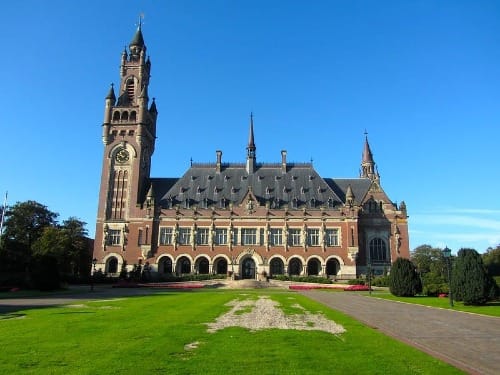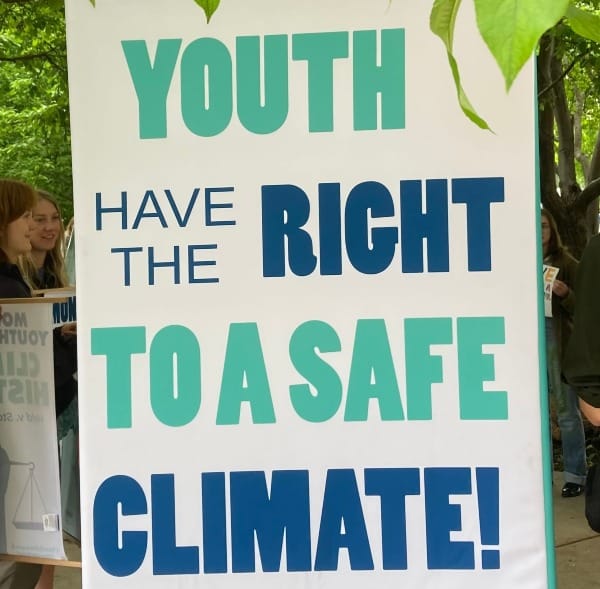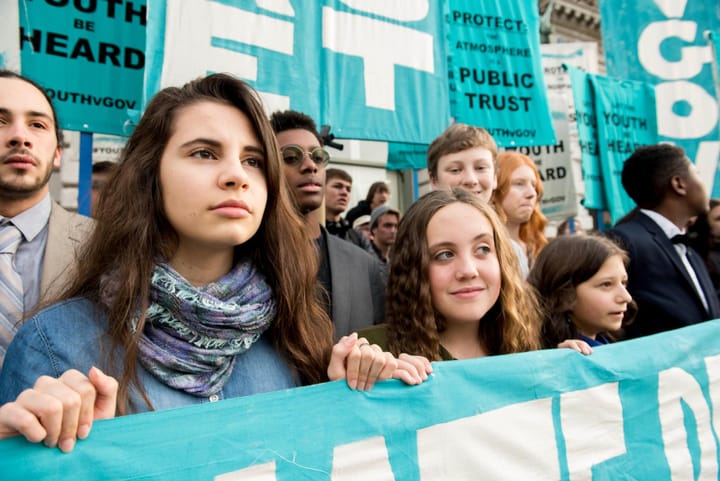International Court Of Justice Sets Schedule For Historic Climate Change Hearings, With Record 100 Oral Statements Expected

Vanuatu, which has led the charge to request an ICJ climate change advisory opinion, is scheduled to testify on December 12.
A record-breaking 100 oral statements are expected to be presented to the International Court of Justice in the upcoming, highly-anticipated public hearings on states’ legal obligations concerning climate change. The hearings, which are scheduled for the first two weeks in December, are part of the procedure of the court issuing an advisory opinion clarifying these legal obligations and consequences for breaching them.
The Pacific Island nation of Vanuatu spearheaded the request to seek a climate change advisory opinion, and the UN General Assembly endorsed the request by a consensus resolution in March 2023. In April this year the court announced that an unprecedented number of written statements – 91 – had been filed with the court’s registry. Additionally, 62 written comments on these statements were submitted by the court’s extended deadline of August 15, 2024. The oral hearings are a chance for countries and organizations to elaborate on their written statements and to testify directly.
The hearings are slated to kick off on December 2 and run through December 13 in The Hague, Netherlands. The ICJ’s Registrar released the oral proceedings schedule directly to participating parties last week, though the schedule and the written statements have not yet been made public. Sources have told Climate in the Courts that the hearing schedule will proceed with countries presenting in alphabetical order according to their French names. The ICJ says it “may decide to make the written statements accessible to the public on or after the opening of the oral proceedings in the case.” The Government of Vanuatu announced in a media statement that it is scheduled to testify on December 12. The statement notes that 100 oral presentations are scheduled, including 88 from country delegations (five Nordic states will issue a joint statement) and the remainder from organizations.
“The release of the oral statements schedule by the International Court of Justice puts us one step closer to one of the most important climate decisions of our time,” Vanuatu’s Attorney General Arnold Kiel Loughman said in the media statement. “The court’s advisory opinion will clarify the obligations of all nations to address historical climate change, as well as prevent future harm to the climate system, the environment and our fundamental human rights.”
The advisory opinion will specifically address the following two questions:
1) What are the obligations of States under international law to ensure the protection of the climate system and other parts of the environment from anthropogenic emissions of greenhouse gases for States and for present and future generations;
2) What are the legal consequences under these obligations for States where they, by their acts and omissions, have caused significant harm to the climate system and other parts of the environment, with respect to:
a) States, including, in particular, small island developing States, which due to their geographical circumstances and level of development, are injured or specially affected by or are particularly vulnerable to the adverse effects of climate change?
b) Peoples and individuals of the present and future generations affected by the adverse effects of climate change?
While not legally binding, ICJ advisory opinions carry great moral authority and serve as current statements of law from what is considered the world’s highest court and the principal judicial body of the United Nations. Legal experts say these opinions can help inform subsequent judicial proceedings such as domestic climate court cases and may influence diplomatic procedures like the annual UN climate negotiations.
“By providing clarifications, by giving negotiators from Global South states, from small island states and vulnerable nations additional legal tools to bolster their positions and needs, this could potentially provide a firmer basis for multilateral solutions,” Joie Chowdhury, a senior attorney at the Center for International Environmental Law (CIEL), said during a July webinar.
Nikki Reisch, director of the Climate & Energy program at CIEL, told Climate in the Courts that the advisory opinion “will undoubtedly have ripple effects around the world.”
“Any additional clarity the ICJ provides on the legal obligations of big polluters can only enhance the basis for progress in the climate negotiations, and strengthen the foundations for climate justice and accountability more broadly,” Reisch said.
A group of law students from the University of the South Pacific first began campaigning on the ICJ climate change initiative in 2019, forming the organization Pacific Island Students Fighting Climate Change that aimed to “bring the world’s biggest problem — climate change — before the world’s highest court.” Vanuatu took up the campaign to seek a UN resolution in 2021, working with a core group of supportive UN member states and backed by more than 1,500 civil society organizations. The UNGA adoption of the resolution in 2023 marked a landmark moment in this journey, and the oral proceedings before the ICJ will be another historic occasion, legal experts and observers say.
According to Margaretha Wewerinke-Singh, a sustainability law professor at the University of Amsterdam and adjunct law professor at the University of Fiji, the ICJ climate change advisory opinion proceedings overall amount to a “watershed moment in the global struggle for climate justice.” The unprecedented level of engagement from parties, she wrote in a recent article, “speaks to the far-reaching implications of climate change and the collective desire to address it in accordance with established legal norms and principles of justice.”
Reisch said the ICJ proceedings are a “once-in-a-generation moment.” The unprecedented level of participation, she added, “reflects both the reality that climate change affects everyone, everywhere, and the urgent need for legal clarity to unlock greater ambition and justice.”
Vanuatu and other small island nations are especially at risk from damaging climate impacts like sea level rise, catastrophic storms and extreme flooding, and without a major change in greenhouse gas emissions trajectories, these countries “have a zero chance of surviving the deluge of threats that climate change has unleashed,” Loughman said. “Globally, we need a seismic shift in global climate policy, a torrent of climate action, to ensure a more just and equitable future for all.”
The Vanuatu attorney general said in the media statement that Vanuatu is “hopeful the ICJ advisory opinion will usher in a new era of climate cooperation” and that the court’s decision “will set the stage for real climate action and lasting solutions to climate change.”
But it comes amidst a backdrop of heightened geopolitical tensions and turmoil, and just last week the International Energy Agency said this fragmentation “poses major risks both for energy security and for global action on reducing greenhouse gas emissions.” A team of international scientists noted in a recent report that despite decades of scientific warnings and nearly 30 UN climate summits, “the world has made only very minor headway on climate change, in part because of stiff resistance from those benefiting financially from the current fossil-fuel based system.”
The US Position
The United States – the world’s richest country by GDP size and the world’s largest historical carbon emitter – is currently among the top expanders of oil and gas production globally, and has been called out as a “planet wrecker-in-chief” and as a non-traditional petrostate. The US and other petrostates (traditional and otherwise) could present stances that are oppositional to climate justice during the ICJ hearings; they are likely to at least argue for preserving the status quo. As a US official stated during remarks delivered to the UN General Assembly on March 29, 2023, the US is overall not supportive of the ICJ climate change advisory opinion initiative. “We believe that launching a judicial process – especially given the broad scope of the questions – will likely accentuate disagreements and not be conducive to advancing ongoing diplomatic and negotiations processes. In light of these concerns, the United States disagrees that this initiative is the best approach for achieving our shared goals, and takes this opportunity to reaffirm our view that diplomatic efforts are the best means by which to address the climate crisis,” Nicholas Hill, the US’s UN representative, said in that statement.
Reisch said the US is likely to argue for limiting the scope of state obligations under existing law and evading legal accountability for climate change harms. “For decades in the climate negotiations, the United States has made a point of denying legal responsibility for climate change and diluting legal obligations to take climate action. If that conduct is any indication, we can expect the US to continue to defend the indefensible before the World Court – urging the Court to look no further than the Paris Agreement in identifying States’ obligations while insisting that the Paris Agreement only requires States to promise climate action, not to uphold those promises, and contending that despite being the largest cumulative emitter, it bears no legal responsibility for remedying the devastating consequences of climate change,” she told Climate in the Courts.
A US State Department spokesperson declined to comment on the ICJ climate change advisory opinion proceedings. The spokesperson declined to disclose when the US is scheduled to speak at the upcoming hearings, as the schedule has not been made public. Under the Biden-Harris administration, the US has advanced its response to the climate crisis through enacting “unprecedented climate legislation” and supporting historic investments in clean energy, mobilizing global climate action, and spurring private sector investment, the spokesperson noted.
The ICJ oral hearings will come just weeks after the US presidential election on November 5 and the COP29 UN climate summit in Azerbaijan from November 11 to November 22.


